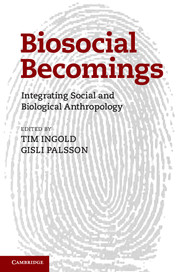Book contents
- Frontmatter
- Contents
- Preface
- 1 Prospect
- 2 Ensembles of biosocial relations
- 3 Blurring the biological and social in human becomings
- 4 Life-in-the-making: epigenesis, biocultural environments and human becomings
- 5 Thalassaemic lives as stories of becoming: mediated biologies and genetic (un)certainties
- 6 Shedding our selves: perspectivism, the bounded subject and the nature–culture divide
- 7 Reflections on a collective brain at work: one week in the working life of an NGO team in urban Morocco
- 8 The habits of water: marginality and the sacralization of non-humans in North-Eastern Ghana
- 9 ‘Bringing wood to life’: lines, flows and materials in a Swazi sawmill
- 10 Humanity and life as the perpetual maintenance of specific efforts: a reappraisal of animism
- 11 Ravelling/unravelling: being-in-the-world and falling-out-of-the-world
- 12 Retrospect
- References
- Notes on the contributors
- Index
7 - Reflections on a collective brain at work: one week in the working life of an NGO team in urban Morocco
Published online by Cambridge University Press: 05 June 2014
- Frontmatter
- Contents
- Preface
- 1 Prospect
- 2 Ensembles of biosocial relations
- 3 Blurring the biological and social in human becomings
- 4 Life-in-the-making: epigenesis, biocultural environments and human becomings
- 5 Thalassaemic lives as stories of becoming: mediated biologies and genetic (un)certainties
- 6 Shedding our selves: perspectivism, the bounded subject and the nature–culture divide
- 7 Reflections on a collective brain at work: one week in the working life of an NGO team in urban Morocco
- 8 The habits of water: marginality and the sacralization of non-humans in North-Eastern Ghana
- 9 ‘Bringing wood to life’: lines, flows and materials in a Swazi sawmill
- 10 Humanity and life as the perpetual maintenance of specific efforts: a reappraisal of animism
- 11 Ravelling/unravelling: being-in-the-world and falling-out-of-the-world
- 12 Retrospect
- References
- Notes on the contributors
- Index
Summary
The following scene is set in Rabat’s district of Agdal; a neighbourhood which boasts many office buildings, upscale apartment blocks, a fancy shopping boulevard, as well as the university. We will enter the office of a small non-governmental organization, located on the third floor of a white modern building, just off the main boulevard.
A sunny Thursday morning in October 2007, shortly after the end of Ramadan, the whole team was present at the office: eight people squeezed into Naima and Thérèse’s office room, which simultaneously served as the office kitchen. Brahim brought folding chairs so that most team-members found seats; others, like me, stood at the back near the door. Thérèse – and her computer – were situated at the opposite end, for everyone to have a good view of the screen and the PowerPoint presentation to be projected on it. Ahmed, the team leader who had ushered everybody in, excitedly explained that it was extremely important that this slideshow should have a positive impact. The diapos should reflect the knowledge and expertise of the whole team. ‘Je veux profiter de toute votre intelligence’, he said. Thérèse started to read out loud, facing the computer while reading, turning around at regular intervals to see the reaction of the team. They went over every sentence, word by word, examining whether they had chosen the right expression for the purpose and for the expected audience. Not everyone was as enthusiastic about this ad hoc meeting. Naima had seen most of it already, as she had sat in on several collaborative work sessions where they had jointly devised the content. She was slightly irritated that, again, it was Thérèse who was writing – who was ‘in control’ – and that Thérèse had apparently added some phrases of her own, probably at home, without consulting the others. Meriem – the new collaboratrice – looked very concentrated and slightly puzzled. She made an effort to understand what it was all about. The technical terms were one thing, but the acronyms of the projects and project partners, as well as the stories surrounding the people mentioned, were a completely different matter. She didn’t raise her voice, tried to take it all in, hoping that everything would become clear in due course. Ahmed sucked up all the commentaries, and encouraged the colleagues to reflect, to think strategically, to imagine creatively how these phrases might be received by future interlocutors.
- Type
- Chapter
- Information
- Biosocial BecomingsIntegrating Social and Biological Anthropology, pp. 123 - 144Publisher: Cambridge University PressPrint publication year: 2013



